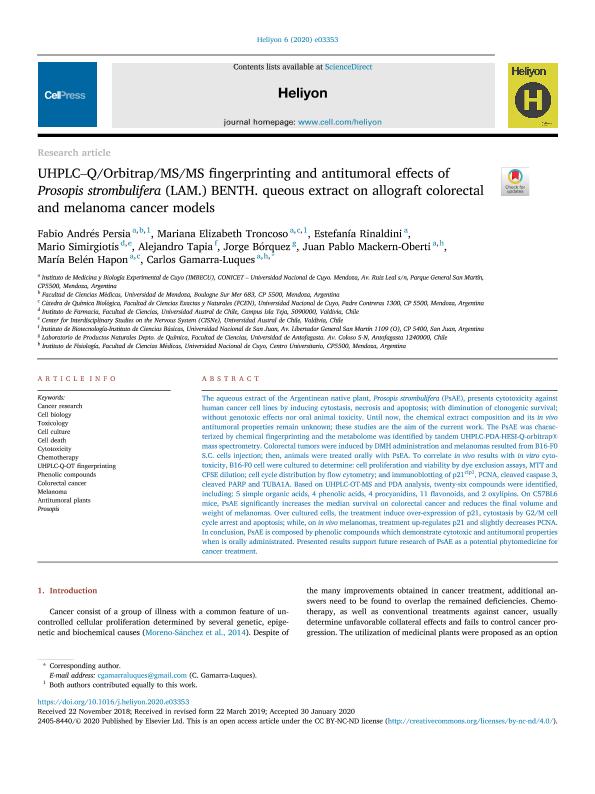Artículo
UHPLC–Q/Orbitrap/MS/MS fingerprinting and antitumoral effects of Prosopis strombulifera (LAM.) BENTH. queous extract on allograft colorectal and melanoma cancer models
Persia, Fabio Andrés; Troncoso, Mariana Elizabeth ; Rinaldini, Estefanía
; Rinaldini, Estefanía ; Simirgiotis, Mario J.; Tapia, Alejandro; Bórquez, JorgE; Mackern Oberti, Juan Pablo
; Simirgiotis, Mario J.; Tapia, Alejandro; Bórquez, JorgE; Mackern Oberti, Juan Pablo ; Hapon, María Belén
; Hapon, María Belén ; Gamarra Luques, Carlos Diego
; Gamarra Luques, Carlos Diego
 ; Rinaldini, Estefanía
; Rinaldini, Estefanía ; Simirgiotis, Mario J.; Tapia, Alejandro; Bórquez, JorgE; Mackern Oberti, Juan Pablo
; Simirgiotis, Mario J.; Tapia, Alejandro; Bórquez, JorgE; Mackern Oberti, Juan Pablo ; Hapon, María Belén
; Hapon, María Belén ; Gamarra Luques, Carlos Diego
; Gamarra Luques, Carlos Diego
Fecha de publicación:
02/2020
Editorial:
Elsevier Inc
Revista:
Heliyon
ISSN:
2405-8440
Idioma:
Inglés
Tipo de recurso:
Artículo publicado
Clasificación temática:
Resumen
The aqueous extract of the Argentinean native plant, Prosopis strombulifera (PsAE), presents cytotoxicity against human cancer cell lines by inducing cytostasis, necrosis and apoptosis; with diminution of clonogenic survival; without genotoxic effects nor oral animal toxicity. Until now, the chemical extract composition and its in vivo antitumoral properties remain unknown; these studies are the aim of the current work. The PsAE was characterized by chemical fingerprinting and the metabolome was identified by tandem UHPLC-PDA-HESI-Q-orbitrap® mass spectrometry. Colorectal tumors were induced by DMH administration and melanomas resulted from B16-F0 S.C. cells injection; then, animals were treated orally with PsEA. To correlate in vivo results with in vitro cytotoxicity, B16-F0 cell were cultured to determine: cell proliferation and viability by dye exclusion assays, MTT and CFSE dilution; cell cycle distribution by flow cytometry; and immunoblotting of p21cip1, PCNA, cleaved caspase 3, cleaved PARP and TUBA1A. Based on UHPLC-OT-MS and PDA analysis, twenty-six compounds were identified, including: 5 simple organic acids, 4 phenolic acids, 4 procyanidins, 11 flavonoids, and 2 oxylipins. On C57BL6 mice, PsAE significantly increases the median survival on colorectal cancer and reduces the final volume and weight of melanomas. Over cultured cells, the treatment induce over-expression of p21, cytostasis by G2/M cell cycle arrest and apoptosis; while, on in vivo melanomas, treatment up-regulates p21 and slightly decreases PCNA. In conclusion, PsAE is composed by phenolic compounds which demonstrate cytotoxic and antitumoral properties when is orally administrated. Presented results support future research of PsAE as a potential phytomedicine for cancer treatment.
Archivos asociados
Licencia
Identificadores
Colecciones
Articulos(IMBECU)
Articulos de INST. DE MEDICINA Y BIO. EXP. DE CUYO
Articulos de INST. DE MEDICINA Y BIO. EXP. DE CUYO
Citación
Persia, Fabio Andrés; Troncoso, Mariana Elizabeth; Rinaldini, Estefanía; Simirgiotis, Mario J.; Tapia, Alejandro; et al.; UHPLC–Q/Orbitrap/MS/MS fingerprinting and antitumoral effects of Prosopis strombulifera (LAM.) BENTH. queous extract on allograft colorectal and melanoma cancer models; Elsevier Inc; Heliyon; 6; 2; 2-2020; 1-11
Compartir
Altmétricas



